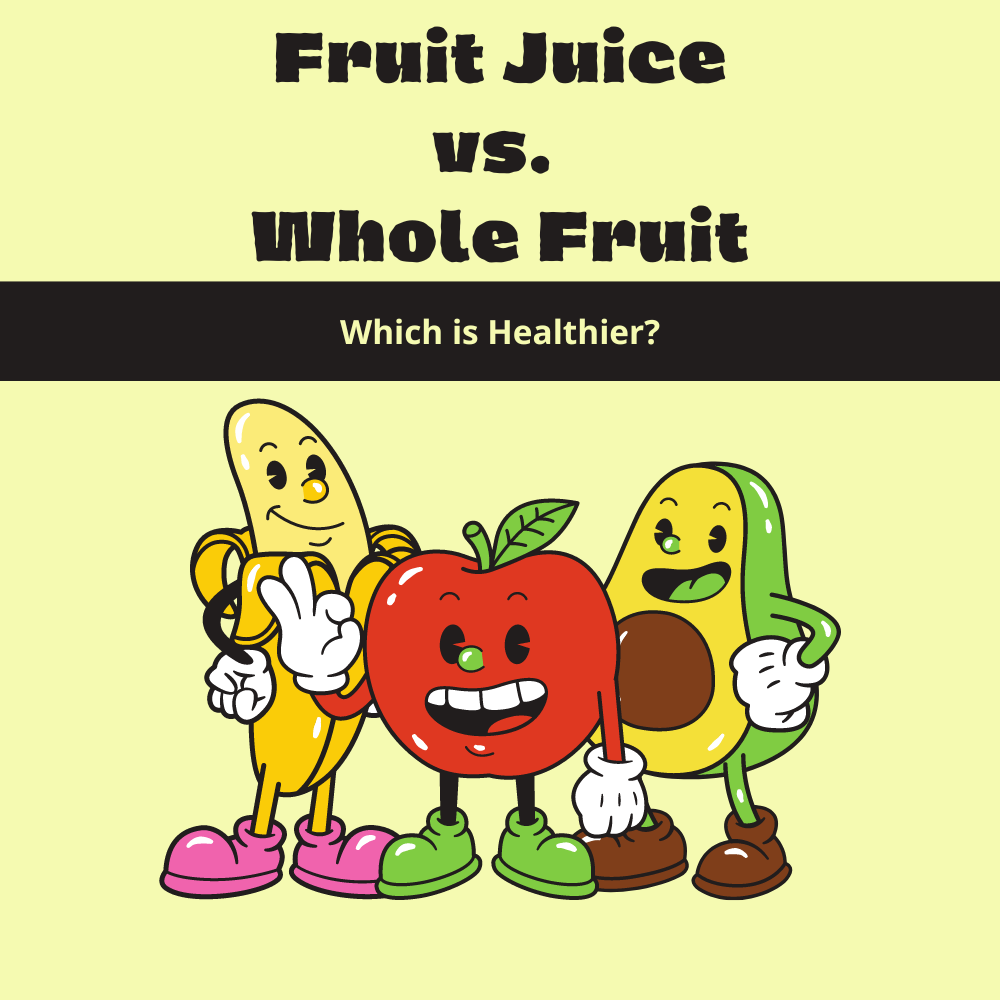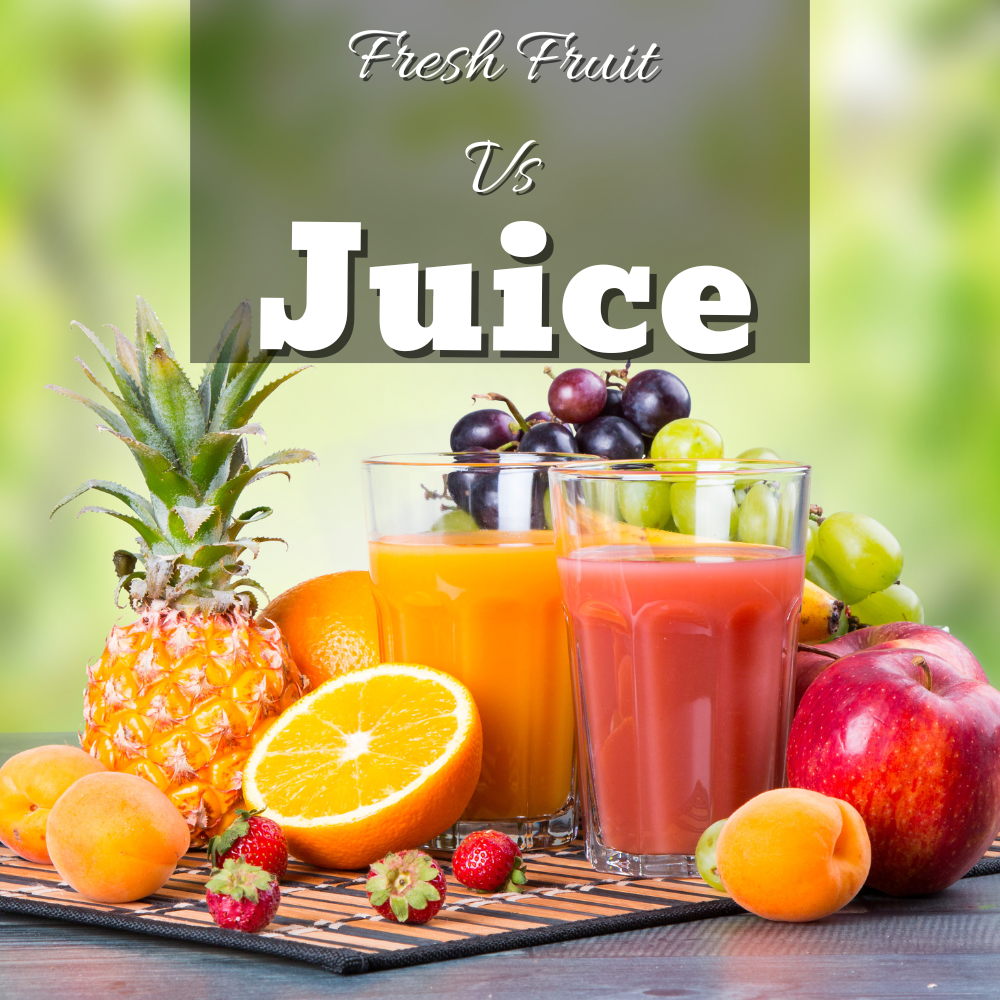Fruit Juice vs. Whole Fruit: Which is Healthier?
When comparing fruit juice and whole fruit, several factors should be considered, including nutritional content, health benefits, and potential drawbacks. Here’s an in-depth analysis to help you decide which option is healthier for you.

Detailed Nutritional Content
Whole Fruit:
- Fiber: Whole fruits are rich in dietary fiber, which:
- Aids digestion by adding bulk to stool and promoting regular bowel movements.
- Helps control blood sugar levels by slowing down the absorption of sugar into the bloodstream.
- Contributes to satiety, helping you feel fuller for longer and reducing overall calorie intake.
- Vitamins and Minerals: Whole fruits provide essential vitamins and minerals, such as:
- Vitamin C: Important for immune function, skin health, and antioxidant protection.
- Potassium: Helps regulate blood pressure, fluid balance, and muscle function.
- Folate: Crucial for DNA synthesis and repair, and important during pregnancy for fetal development.
- Antioxidants: Whole fruits contain various antioxidants, like flavonoids and polyphenols, which help:
- Protect cells from oxidative stress and reduce inflammation.
- Lower the risk of chronic diseases such as heart disease, cancer, and neurodegenerative disorders.
- Phytonutrients: These plant compounds provide additional health benefits, including:
- Anti-inflammatory properties.
- Enhanced immune response.
- Improved cardiovascular health.
Fruit Juice:
- Reduced Fiber: Most fruit juices lack the fiber found in whole fruits due to the removal of pulp and skin during processing. This:
- Decreases the juice’s ability to aid in digestion and blood sugar regulation.
- Reduces the feeling of fullness, potentially leading to increased calorie consumption.
- Vitamins and Minerals: While fruit juice contains vitamins and minerals, the levels can be lower compared to whole fruits due to processing. Important nutrients include:
- Vitamin C: Although present, its concentration can diminish over time and with exposure to air.
- Potassium: Found in many fruit juices, but the amount can vary depending on the type of juice.
- Concentrated Sugar: Fruit juice has a higher concentration of natural sugars, which can:
- Lead to rapid spikes in blood glucose levels.
- Increase the risk of insulin resistance and type 2 diabetes if consumed in excess.
- Calories: Fruit juice is often more calorie-dense than whole fruits, making it easier to consume more calories quickly, potentially leading to weight gain.

Detailed Health Benefits
Whole Fruit:
- Digestive Health: The fiber in whole fruits supports:
- Healthy digestion by promoting regular bowel movements.
- A balanced gut microbiome, which is linked to improved overall health.
- Blood Sugar Regulation: Fiber slows down the absorption of sugar, preventing spikes in blood sugar levels and aiding in the management of diabetes and insulin sensitivity.
- Satiety and Weight Management: The fiber and water content in whole fruits help you feel fuller for longer, which can aid in weight management by reducing overall calorie intake.
- Nutrient Density: Whole fruits provide a complex mix of nutrients that work synergistically to support overall health, reducing the risk of chronic diseases.
Fruit Juice:
- Hydration: Fruit juice can contribute to your daily fluid intake, helping to keep you hydrated, which is essential for overall health.
- Quick Energy: The natural sugars in fruit juice provide a quick source of energy, which can be beneficial for athletes or individuals needing a rapid energy boost.
- Nutrient Boost: Some fortified fruit juices can provide additional vitamins and minerals not always available in whole fruits, such as vitamin D and calcium.
- Convenience: Fruit juice is easy to consume and is readily available, making it convenient for busy lifestyles.
Detailed Pros and Cons
Whole Fruit: Pros:
- High in Fiber: Supports digestion, blood sugar regulation, and satiety.
- Lower Glycemic Index: Helps in blood sugar regulation, reducing the risk of diabetes.
- Nutrient-Dense: Provides a wide range of essential vitamins, minerals, and antioxidants.
- Promotes Fullness: Aids in weight management by reducing overall calorie intake.
Cons:
- Less Convenient: Can be less convenient for on-the-go consumption.
- Shorter Shelf Life: Requires proper storage to prevent spoilage and maintain freshness.
Fruit Juice: Pros:
- Convenient: Easy to consume, especially on-the-go, and readily available.
- Fortified Options: Can provide additional nutrients through fortification.
- Good for Quick Energy: Provides a rapid source of energy and hydration.
Cons:
- Lacks Fiber: Important for digestive health and blood sugar regulation.
- Higher Glycemic Index: Leads to rapid spikes in blood sugar levels, increasing the risk of insulin resistance.
- Added Sugars and Preservatives: Some fruit juices contain added sugars and preservatives, reducing their overall health benefits.
- Calorie-Dense: Easier to consume excess calories, potentially leading to weight gain.
Conclusion
Overall Health: Whole fruits are generally the better choice due to their higher fiber content, nutrient density, and ability to regulate blood sugar levels. They support digestive health, help you feel full longer, and provide a broad spectrum of essential nutrients.
Convenience: Fruit juice can be a good option for quick consumption and hydration, but it should be consumed in moderation due to its higher sugar content and lower fiber levels.
Best Practice: Incorporate a variety of whole fruits into your diet for optimal health benefits. If you choose to drink fruit juice, opt for 100% juice without added sugars and limit the quantity to avoid excessive sugar intake. Balancing both whole fruits and fruit juice in your diet can help you enjoy the benefits of both while minimizing potential drawbacks.
FAQ: Fruit Juice vs. Whole Fruit: Which is Healthier?
1. Why is fiber important in whole fruits?
Fiber is crucial for digestive health, helping to promote regular bowel movements, control blood sugar levels, and increase satiety. It can also help lower cholesterol levels and reduce the risk of certain chronic diseases.
2. How does the sugar content differ between whole fruits and fruit juice?
Whole fruits contain natural sugars along with fiber, which slows the absorption of sugar into the bloodstream. Fruit juice, on the other hand, often has higher concentrations of sugar and lacks fiber, leading to quicker spikes in blood sugar levels.
3. Is drinking fruit juice as hydrating as eating whole fruit?
Yes, fruit juice can be hydrating due to its high water content. However, whole fruits also contribute to hydration while providing fiber and other nutrients.
4. Can fruit juice be part of a healthy diet?
Fruit juice can be part of a healthy diet if consumed in moderation and as part of a balanced diet. It’s best to choose 100% fruit juice without added sugars and limit intake to recommended serving sizes.
5. What are the benefits of consuming whole fruits over fruit juice?
Whole fruits offer the benefits of fiber, which aids in digestion, blood sugar regulation, and satiety. They also provide a broader range of nutrients and antioxidants that work synergistically to support overall health.
6. Are there any downsides to drinking fruit juice?
Yes, potential downsides include high sugar content, lack of fiber, and the possibility of consuming added sugars and preservatives in some commercial juices. These factors can contribute to weight gain, blood sugar spikes, and reduced overall health benefits.
7. Is it better to eat fruits or drink fruit juice for weight management?
Eating whole fruits is generally better for weight management because the fiber content helps you feel fuller for longer, reducing overall calorie intake. Fruit juice lacks fiber and can be more calorie-dense, making it easier to consume excess calories.
8. How can I make fruit juice healthier?
To make fruit juice healthier, opt for 100% juice with no added sugars, limit portion sizes, and consider diluting juice with water to reduce sugar content. You can also blend whole fruits into smoothies to retain the fiber.
9. Do whole fruits and fruit juice offer the same vitamins and minerals?
While both provide vitamins and minerals, whole fruits typically offer higher levels due to less processing. The nutrient content in juice can diminish over time, especially if exposed to air and light.
10. What are some examples of high-fiber fruits?
Examples of high-fiber fruits include apples, pears, raspberries, blackberries, and oranges. These fruits provide a good amount of dietary fiber along with essential vitamins and minerals.
11. Can fruit juice contribute to daily fruit intake recommendations?
Yes, fruit juice can contribute to daily fruit intake recommendations, but it should not replace whole fruits entirely. It’s best to consume a mix of whole fruits and limited amounts of fruit juice to meet nutritional needs.
12. Is fresh-squeezed juice better than store-bought juice?
Fresh-squeezed juice is generally better than store-bought juice because it typically contains no added sugars, preservatives, or other additives. However, it still lacks the fiber found in whole fruits.
13. How much fruit juice is considered a healthy serving?
A healthy serving of fruit juice is typically 4-6 ounces (about 120-180 milliliters) per day. This amount can help you enjoy the benefits of juice without consuming excessive sugar and calories.
14. Can children drink fruit juice?
Yes, children can drink fruit juice, but it should be limited to small servings (4 ounces or less per day) and offered as part of a balanced diet that includes whole fruits and vegetables.
15. What is the impact of fruit juice on dental health?
Fruit juice, especially when consumed frequently, can contribute to tooth decay due to its high sugar content and acidity. Drinking juice through a straw, rinsing with water afterward, and practicing good oral hygiene can help mitigate these effects.